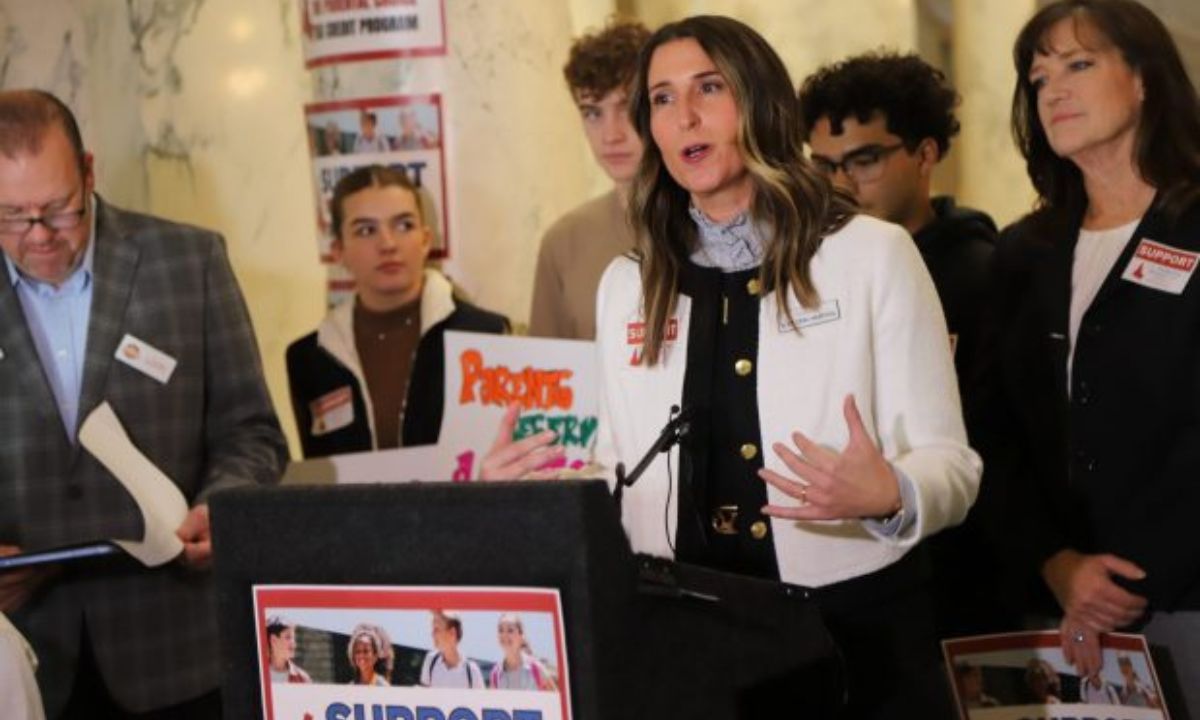Republications Unveil Private School Tax Credit Proposal
$50 million parental choice program would provide $5,000 tax credit to Idahoans looking to fund private school costs

Get stories like this delivered straight to your inbox. Sign up for The 74 Newsletter
A pair of Republicans unveiled a new proposal Friday designed to help Idahoans fund private school: a $5,000 tax credit.
Surrounded by “school choice” advocates in the Statehouse, Sen. Lori Den Hartog, R-Meridian, and Rep. Wendy Horman, R-Idaho Falls, announced the $50 million “parental choice tax credit” program.
It’s the latest Idaho proposal that seeks to open up public funds for private education. Den Hartog and Horman, who have been leading proponents of the “school choice” movement in Idaho, plan to introduce the bill during the upcoming legislative session, which starts Monday.
“In a time of high inflation and economic uncertainty, the increased concern over the alignment of family values and education, this proposal is designed to support Idaho parents as they make decisions about their child’s education,” Den Hartog said.
The proposal has two parts. First, private school families of any income could claim $5,000 tax credits for expenses “related to the nonpublic academic instruction,” Den Hartog said. That includes tuition, fees, transportation, tutoring, test-taking and exam preparation, among other things.
Qualifying students would be school-aged and enrolled in a non-public school, which could include religious schools and home schools. The tax credits would be first come, first served with a $40 million cap.
A second bucket of state funds — $10 million — would be set aside for a “kickstart” program benefitting low-income students. Rather than claiming private school expenses on their taxes, families who qualify for the federal earned income tax credit could collect up to $5,000 in grants for one year. After a year, those families would be rolled into the tax credit program.
In recent years, similar legislation has failed in the face of widespread anxiety about expending public funds on private schools. Opponents of similar mechanisms — often called “vouchers” — worry about a lack of accountability for private school expenses and fear that limited public school funds would be siphoned.
Public school leaders have bitterly fought proposals to fund private education at the state level. Quinn Perry, policy and government affairs director for the Idaho School Boards Association, told Idaho Education News this week that private school voucher programs in other states have been “budget busters.”
Arizona’s expanding school voucher program is expected to cost taxpayers $900 million this school year. Initial estimates in the Grand Canyon State pegged the cost at $65 million.
The Arizona Mirror reported last week that the state faces a $400 million deficit, because of the rising cost of private school vouchers and decreasing state revenue due to a new flat income tax — which Idaho also enacted, in 2022.
Den Hartog and Horman brushed aside those concerns Friday. They touted the proposed spending caps and the fact that the State Tax Commission would oversee the tax credits and grants, creating an “accountability measure” backed by the threat of perjury for lying on one’s taxes.
Horman, a former public school board trustee who co-chairs the Legislature’s powerful budget committee, said the program would be “complementary” to Idaho’s public school system. She said she wouldn’t support a policy that harms public education.
“I am not a fan of budget-busting bills,” Horman said.
Den Hartog and Horman also acknowledged that those caps could increase in future years, if demand calls for it.
House Assistant Minority Leader Lauren Necochea slammed the proposal in a conversation with reporters Friday. The Boise Democrat said funneling the money through the Tax Commission is likely a strategy to sidestep the House Education Committee, which blocked similar legislation last year.
“Whether it’s the state Tax Commission cutting the check or another agency, the result is the same: dollars are being siphoned out of the fund that we use for public schools and will go towards private, religious and, potentially, for-profit institutions with zero accountability,” Necochea said.
National groups that advocate for “school choice” in recent years have spent heavily lobbying Idaho lawmakers to pass a private school voucher policy. But Friday’s news conference demonstrated homegrown support, as well. Dozens of children and parents held signs reading “support the parental choice tax credit program.”
Robbe Hart, a single father from Emmett, said he commutes more than 60 miles, round-trip, for his sons to attend Greenleaf Friends Academy. The travel is “extremely expensive,” Hart said, but his sons have “thrived” at the Christian school.
“If this bill passed, it would help thousands of other people that are going through the same thing that I go through,” he said.
Get stories like these delivered straight to your inbox. Sign up for The 74 Newsletter

;)